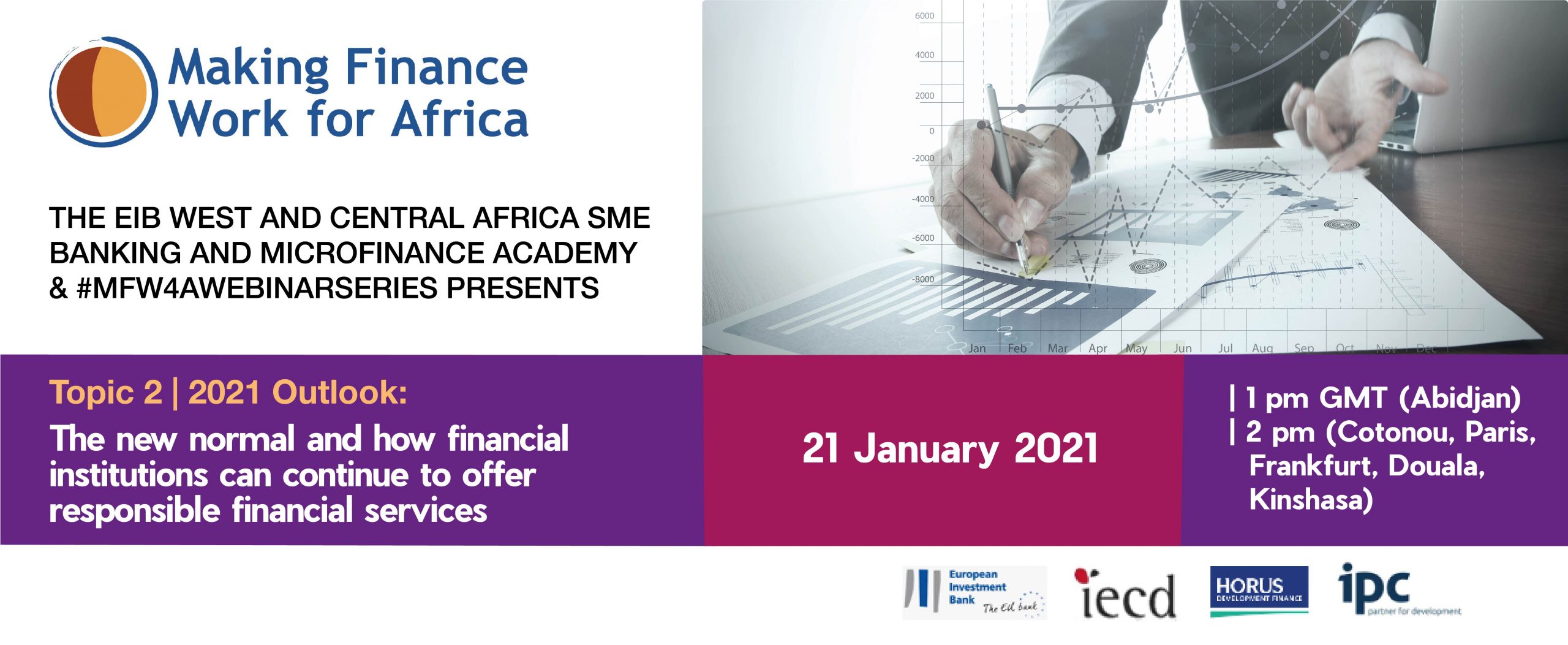THE EIB WEST AND CENTRAL AFRICA SME BANKING AND MICROFINANCE
ACADEMY 2020-2021 WEBINAR SERIES
• Topic 1: Strengthening and adapting portfolio management for banks in West & Central Africa in the context of the crisis
18th November 2020, 01 pm (Abidjan) / 02 pm (Cotonou, Paris, Frankfurt, Douala, Kinshasa)
The second in a series of four webinars organized by the EIB Academy dedicated to SME banking and microfinance in West and Central Africa, in partnership with Making Finance Work for Africa (MFW4A), was held on January 21, 2021. Its theme was “Prospects for the year 2021: What will the new normal look like and how can financial institutions continue to provide responsible financial services? »
The audience was at the rendez-vous with more than 300 participants, proof, if proof were needed, of the relevance of the subject for banks and microfinance institutions, seeking new ways to return to growth, while remaining attentive to the consequences and risks generated by the Covid 19 crisis, the spectre of which remains very present, despite a better situation in Africa than in some parts of the world.
Mr. Ruben Dieudonné, Regional Director Baobab WAEMU and General Manager Baobab Côte D’Ivoire, was invited to speak on how financial institutions can support Micro, Small and Medium Enterprises (MSMEs) in 2021, given that moratoria and grace periods are coming to an end, increasing pressure on portfolio quality, while at the same time financial institutions have a crucial role to play in the revival of MSMEs.
The panelist described how, after adopting an emergency exit strategy, Baobab quickly realized that the crisis would last and that a longer-term plan was needed to restart operations while controlling risks. By maintaining communication with clients (even remotely), an analysis of their individual situations made it possible to classify the loan portfolio according to the level of impact of the crisis on the activities concerned, and thus to offer a range of customized solutions that are regularly re-evaluated. Thanks to this approach, Baobab has managed to curb the effects of the crisis and even to resume active financing of MSMEs in Q3 2020. In this context, Ruben is resolutely optimistic about the prospects for recovery in 2021.
The second speaker, Nana Araba Abban, Director of Retail Banking at Ecobank Transnational Incorporated presented her vision of the role played by digitalization in adapting to the crisis, taking into account not only the need to reduce customer flows in branches as a precautionary measure against Covid 19, but also the importance of developing a comprehensive digital strategy in collaboration or competition with Fintechs.
She highlighted the opportunity presented by digital financial services to diversify revenue streams and improve the customer experience, especially in the context of the pandemic. According to Nana, this is a necessary evolution to ensure an inclusive offer of financial services to individuals and SMEs. These digital financial services need to be developed in collaboration with strategic partners, such as cell phone operators. Ecobank has thus created a digital ecosystem based on these partnerships and the use of various technological innovations (chatbot, applications, etc.).
Finally, Olivier Edelman, Director of the Microfinance Unit of the European Investment Bank, gave a presentation on how the needs of financial institutions have been affected by the crisis and the role of Development Finance Institutions in helping them overcome the crisis and ensure the continuity of their activities in 2021, while continuing to provide responsible financial services.
The presenter indicated that the crisis has had various impacts on financial institutions, including liquidity needs (which have been relatively well managed to date). An increase in SME delinquencies and increased capital needs of financial institutions could occur in the coming months.
To support financial institutions, Development Finance Institutions can offer portfolio guarantees, facilitate access to capital and subordinated debt, and play a counter-cyclical role by providing financing in difficult times. The EIB tries to respond to the needs of its financial partners and has thus adapted its offer by, among other things, accelerating disbursement procedures for existing loans, offering portfolio guarantees, or continuing its lending operations but also participation in investment funds.
After an exchange session with the participants, the panelists shared some concluding messages, highlighting the resilience of Africa and the opportunity offered through this crisis-accelerated digitalization to reinvent itself to adapt to a changing world. The webinar concluded on this note of optimism.




